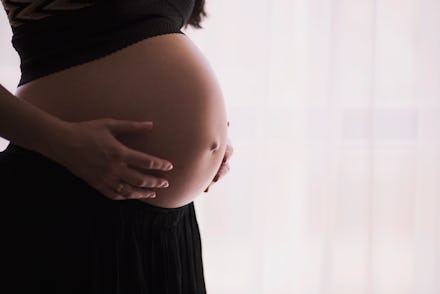What Age Should You Have a Baby? A New Study Has a (Depressing) Answer for Working Women

We already know about the wage gap, or the idea that a woman makes 77 cents for every dollar a man makes. But it turns out that even the age when a woman has her first child could impact her career and earning potential.
A recent study of Danish women's income inequality published by the journal PLOS One found that women who have children after the age of 30 earn more than those who start families earlier. The gap is worst for mothers who have a child before 25. The research suggests that working mothers have little hope of "catching up" to the lifetime earning potential of childless women — unless they wait until after age 35 to have their first kid.
Co-authored by Dr. Fane Groes, a fellow economics professor at Copenhagen Business School, the study relied on 14 years of data on birth and household statistics for nearly 1.6 million Danish women between the ages of 25 and 60. The statistics prove that when women choose to have their first child can cost them a whopping 2.5 years of income throughout their career — even in Denmark, a country with one of the best maternity leave policies in the world.
"I would expect the effect to be stronger for American women," study co-author Raul Santaeulalia-Llopis, an assistant professor of economics at Washington University in St. Louis, said in a phone interview. Santaeulalia-Llopis said that's largely because individual income growth is greater in the United States than in Denmark: "American women have more to lose, [because] their potential income loss is greater."
Santaeulalia-Llopis cautioned that we can't be sure if the study's results apply to other countries. Yet if nothing else, the study underscores the fact that women are saddled with an impossible choice when biology and social expectations collide: Even though women have a better chance of having healthy children and a safer pregnancy if they have a baby before they turn 30, fertility tends to drop dramatically by the time they hit that age.
Despite the cultural myth that women can "have it all" — i.e., juggle career and family goals — the study shows working women clearly have to make a choice between the two. It's something of a depressing takeaway, to say the least — and even Santaeulalia-Llopis admits he doesn't know what family planning advice he can offer women based on the study.
"We are just putting the trade-off on the table," he said. "It's important to understand the trade-off. For me, this should influence policy...it opens up a box of potential policies we didn't think about before."
Santaeulalia-Llopis thinks employers could consider supporting women with fertility treatments if they want to postpone family planning, as well as offer maternity leave policies that keep women on track for promotion. There are companies like Apple and Facebook, which allow employees the option to freeze their eggs, that offer some of these options. But the vast majority of low-income mothers and women of color, who already suffer disproportionately from the wage gap, don't have access to these kinds of benefits.
h/t Vocativ